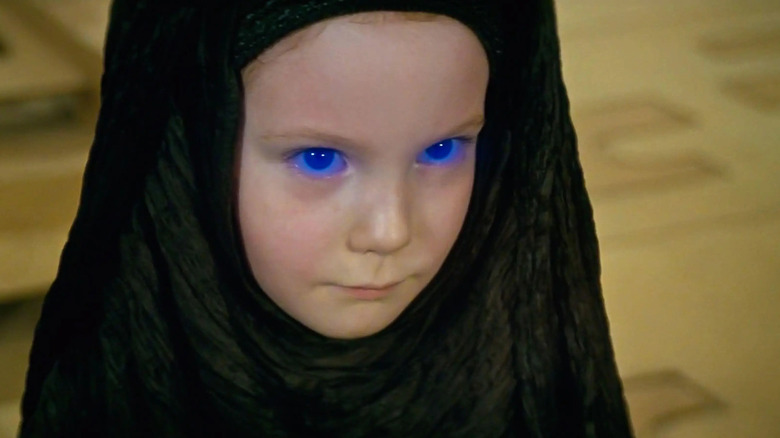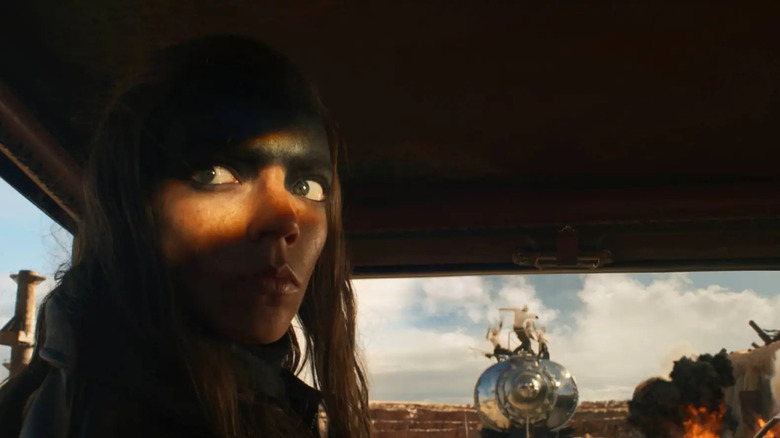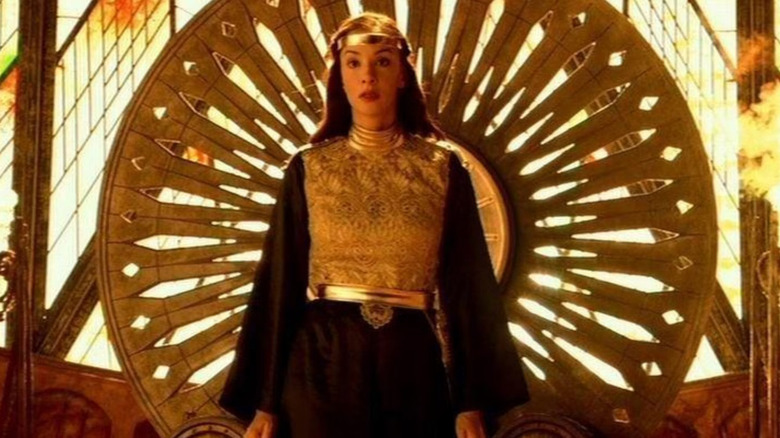Dune: Part Two Omitted A Toddler Alia Due To A Number Of Concerns
"Dune: Part Two" spoilers follow.
In Frank Herbert's 1965 novel "Dune," the main character Paul Atreides, and his mother Jessica, flee into the deserts of Arrakis to escape a successful attack on their home by the murderous House Harkonnen. They fall in with the Fremen, the nomadic natives of Arrakis, and Paul will grow to become their leader. Thanks to some manipulation from Jessica, Paul will also come to be considered the Fremen Messiah. When they first fled, Jessica was pregnant. In her years with the Fremen, Jessica will give birth to a girl named Alia. She will grow to be a toddler with eerie powers, granted to her by the Water of Life, a semi-poisonous worm excretion that Jessica drank while pregnant.
In David Lynch's 1984 film adaptation of "Dune," Alia is played by a young Alicia Witt and voiced by an adult actress. In the 2000 miniseries adaptation of "Dune," the young Alia was played by Laura Burton. The adult Alia was played by Daniela Amavia in the 2003 follow-up, "Children of Dune."
In Denis Villeneueve's new hit film "Dune: Part Two," the timeline of events is slightly different. Jessica does indeed fall into the care of the Fremen while pregnant, and she does indeed drink the Water of Life, but the young Alia is not yet born before the film concludes. Screenwriter Jon Spaihts, instead, depicts Jessica having psychic conversations with Alia while the girl was still a developing fetus. Paul also speaks to Alia in a dream sequence wherein she was already an adult and played by Anya Taylor-Joy.
In a new interview with Mashable, Spaihts addressed the omission of Alia from his version of "Dune," citing practical concerns; it would have been hard, he notes, to film in the deserts of Jordan with a real-life toddler on set.
Toddler Alia
For Spaihts, hiring a toddler to play Alia was simply not practical for a production on the scale of "Dune: Part 2." Not only was it an extended location shoot in the desert, but Alia would have to share scenes with large crowds of people. Putting a 6-year-old in that scenario would likely scare them and delay production. Spaihts also noted that modern technology has become advanced enough to realize Alia through CGI and/or motion capture ... but that was just asking for trouble. The screenwriter said:
"These days, digital tools exist to allow you to map an actor's performance on anything, even a talking banana. [...] So you could definitely make a toddler-looking entity talk with an adult voice. But I think that's still fraught with peril. You could find yourself creating something that was unintentionally funny or off-putting."
One only needs to recall the horrors of Renesmee Cullen from "The Twilight Saga: Breaking Dawn – Part 1" to be reminded that digital children with motion-captured faces are a horror to behold. Yes, "Dune: Part Two" was made in 2024, when films like "Avatar: The Way of Water" already proved that motion capture has advanced by leaps and bounds — the 74-year-old Sigourney Weaver played a teenager in that film — but it still might not yet be good enough to create a toddler from scratch.
So Alia couldn't be played by a live actress, and no one felt it wise to create Alia out of SFX, no matter how advanced. At an impasse, Spaihts had to come up with another solution. He just left Alia out of the story almost entirely.
Alia is an afterthought anyway
Alia plays a major role in Frank Herbert's "Dune" sequels "Dune Messiah" (1969) and "Children of Dune" (1976), but is still a toddler at the end of the first "Dune." In the books, and in Lynch's film, the young Alia plays a more active role in the story in that she murders the evil Baron Harkonnen, and shows — through her psychic powers — that there is a mystical element to the "Dune" story. Spaihts clearly wanted to eschew the supernatural elements of "Dune," focusing instead on the tale's political intrigue. As such, Alia's presence would only serve as a distraction. The screenwriter also felt that Alia would have offered a child's perspective on "Dune," which he most certainly didn't want. This was a story of grown-ups. As such, Alia was reduced to a fetus. Spaihts said:
"It would pull focus from what I think the real headline drama is, which is the interplay between the adult characters that we've been watching now for two epic films."
By keeping Jessica pregnant in "Dune: Part Two," Spaihts also was afforded a condensed timeline that would keep the death of Duke Leto (killed in "Dune: Part One") fresh in the minds of the characters. Now, the events of "Part Two" take place in five months rather than several years. Spaihts added:
"If Duke Leto died years ago, how much are Jessica and Paul feeling that death? They will have metabolized it to a certain extent. If the Baron launched his push against the Atreides on Arrakis with the Emperor's help years ago, it's beginning to be eclipsed by other news."
Which is a fair concern when adapting a sprawling story like "Dune" to the screen. It's a pity audiences didn't see Alia, but Spaihts' logic is sound.


